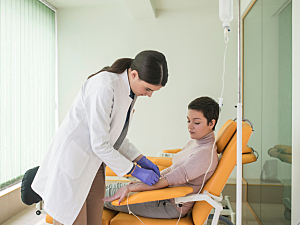Pegloticase is a pegylated recombinant uricase that metabolizes uric acid to the water soluble allantoin, thus decreasing the risk of formation of precipitates. It is indicated for use in patients with refractory gout and in those who can’t tolerate urate-lowering therapy. Unfortunately, the development of antidrug antibodies can require premature discontinuation of pegloticase.
Preliminary clinical trials and case series support using an immunomodulator such as methotrexate in conjunction with pegloticase to increase urate-lowering response durability. Now, investigators at 42 U.S. sites have conducted the first large, randomized, double-blind, placebo-controlled trial of this approach.
In Arthritis & Rheumatology, they report week 24 results of a 52-week trial. These data confirm the superiority of pegloticase plus methotrexate co-therapy over pegloticase monotherapy. They also provide evidence that methotrexate decreases pegloticase immunogenicity by attenuating antidrug antibody development.
Michael E. Weinblatt, MD, associate director of the Center for Arthritis and Joint Diseases at Brigham and Women’s Hospital and Professsor of Medicine at Harvard Medical School, has spent more than four decades studying methotrexate in rheumatic diseases and served as the senior author on this study.
Methods
In the MIRROR trial (Methotrexate to Increase Response Rates in Patients with Uncontrolled Gout Receiving Pegloticase), patients began on two weeks of methotrexate therapy along with folic acid 1 mg/day. Patients who tolerated methotrexate were randomly assigned 2:1 to receive pegloticase plus methotrexate or pegloticase plus placebo. Patients were required to have a glomerular filtration rate of >40 to enroll in the study.
Randomized participants first entered a four week run-in period, taking folic acid and either methotrexate or placebo. 145 patients (96 receiving methotrexate, 49 receiving placebo) then entered the 52-week treatment period. Pegloticase 8 mg was given biweekly from day 1 to week 50 (26 infusions), and folic acid was continued with a methotrexate dosage of 15 mg/week.
If a patient had serum urate levels >6 mg/dL at two consecutive visits beginning at week 2, treatment was discontinued, but the patient remained in the study under observation. 73% of patients on methotrexate and 39% of those on placebo completed treatment through week 24, the time point for this analysis.
Efficacy
The primary efficacy endpoint was the proportion of patients showing treatment response, defined as a serum urate level of <6 mg/dL for ≥80% of visits during weeks 20–24. That endpoint was met in 71% of patients in the pegloticase plus methotrexate group compared with 39% in the pegloticase plus placebo group (P<0.0001).
The combination regimen also outperformed monotherapy concerning:
- Mean change from baseline in serum urate through week 24: −7.66 vs. −5.23 mg/dL (P<0.0001)
- Median time to two consecutive serum urate measurements >6 mg/dL: Not estimable (too few patients discontinued) vs. 69 days (P<0.0001)
- Complete tophus resolution at week 24: 35% versus 14% of patients (P=0.0434)
Safety
Reports of adverse events (AE) and serious AEs were comparable between treatment groups, and there was no new safety signal. Gout flare was the most common AE in both groups.
The incidence of infusion reactions was considerably lower with combination therapy (4.2%) than monotherapy (4.2% vs. 30.6%; P<0.001).
Immunogenicity
The immunogenicity of pegloticase was lower with the use of methotrexate:
- The proportion of patients with post-baseline anti–polyethylene glycol (anti-PEG) antibody positivity: 23% in the pegloticase plus methotrexate group vs. 50% in the pegloticase plus placebo group
- Median time to positive anti-PEG antibody response: Not estimable in the pegloticase plus methotrexate group vs. 155 days in the pegloticase plus placebo group (P=0.0008)
In both treatment groups, fewer patients with anti-PEG antibody positivity were treatment responders during month 6 than patients without the antibodies (55% vs. 81%, respectively). There were 25% in the methotrexate group vs. 58% in the placebo group.
